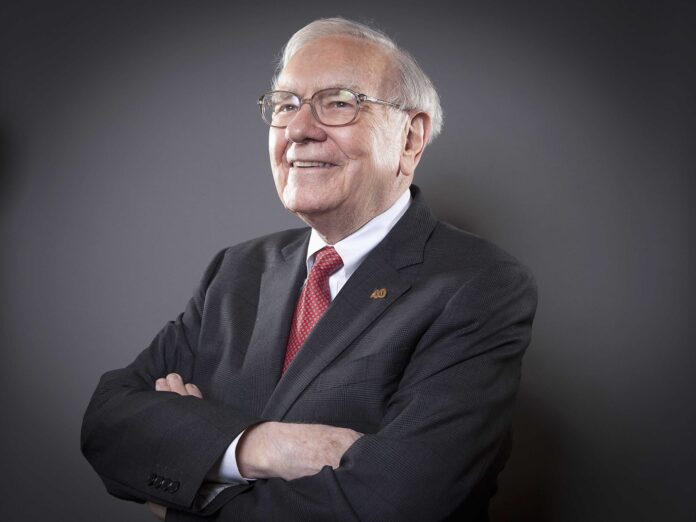All right, you had to know this one was coming, right?
A whole website without a single article about the almighty Warren? It’s beyond shameful, I know.
So, to redeem myself, I’ve gathered Warren Buffett’s 10 rules for successful investing that are useful to any long-term investor.
This article draws heavily from the book The Warren Buffett Way, written by Robert G. Hagstrom.
Hagstrom’s book is one of the best investment books for value investors and a great portrait of one of the greatest investors of all time. I highly recommend reading this one, if you haven’t already. It’s one of those rare books that you can read and re-read time after time.
Don’t Lose Money
Warren was once filmed saying in an interview “The first rule of an investment is don’t lose [money]”.
The idea behind the statement is that when you buy a stock that’s priced below its intrinsic value, you don’t lose money. If you do your research and manage to buy a wonderful company at a bargain, you’re not likely to lose money.
Even if the investment doesn’t pan out as well as you’d hoped, you can still make a profit because of the margin of safety. We take a closer look at this term in chapter 4.
Oh, and if you watched the clip there’s also a plot twist:
Right after the first rule, he said that the second rule is to never forget the first rule, and that’s all the rules there are.
So, a smart man would’ve only written this one part and been done. Fortunately, I’m nowhere near that smart, so let’s see what other rules we can find from Buffett’s investing philosophy.
Focus on the Long-Term
First and foremost, Buffett is a long-term investor. His “favorite holding period is forever”, which is quite a long time.
There are a lot of benefits to Buffett’s long-term approach. I wrote a piece comparing short-term and long-term investing, where I took a closer look at the pros and cons of both investment styles.
To summarize, we could simply say that longer holding periods enable higher returns.
Hagstrom and his colleagues conducted a study with the S&P 500 to show the benefits of longer holding periods. Between 1970 and 2012, the average number of stocks that doubled in rolling five-year periods was 29.9 percent.
For comparison, during any one-year period, only 1.8 percent or 9 stocks out of 500 doubled.
So, going long can certainly pay off. The biggest reason for this might simply be that it takes time for a stock to go up in price. This is one of the reasons why value investors should only buy companies that they feel comfortable owning for a long time.
Of course, it’s worth remembering that you have to make the right investment decision in the first place to get the said higher returns. Luckily Buffett hasn’t had that problem so far.
Let it Compound
Since Buffett made his first investment at the respectable age of 11, he has been in the market for 81 years. Not many people in the world can say that.
Buffett is an example of what a lifetime of compounding returns can amount to.
Berkshire’s stock has had an average annual return of 20% since 1965. If you’d invested $1000 in Berkshire Hathaway in 1965 and had let it accumulate, you would have $4,388,714.39 today.
Buffett demonstrates the fact that when you have a highly profitable business and are able to invest your returns back into the business, the long-term results are extraordinary.
This is the main reason why Berkshire doesn’t pay any dividends. When you think about it, it’s completely rational. If you invest in something that generates an annual return of 20%, it doesn’t make sense to demand dividends unless you can get more return from investing the money yourself.
So, for Buffett and many other successful investors, it’s the long-term approach with compounding returns that have granted the best results.
Margin of Safety
Buffett once said that “It’s far better to buy a wonderful company at a fair price than a fair company at a wonderful price”.
What this means is you should invest in quality companies that are highly profitable instead of unprofitable companies that you can buy at a bargain.
However, you can still overpay for a wonderful company, which is why value investors usually require a margin of safety from their investments.
The margin of safety refers to the concept of buying a particular stock below its intrinsic value.
Usually, this happens either when the whole stock market is down or when a single company is trading below its intrinsic value. The idea is that the stock eventually goes up in price and the stock price catches up with the company’s intrinsic value.
When you require a certain amount of safety margin from your investments, you’re less likely to make a bad investment.
It’s worth remembering that a great company isn’t necessarily a great investment. If you wildly overpay for a great company, it can take a long time to gain returns. Not to mention if you overpay for a poor company. So, to sum it all up: don’t buy expensive stuff.
Usually, when the market is at an all-time high, there are fewer opportunities to make great investments. This is why Buffett usually holds quite a lot of cash for potential purchases.
The upside of this approach is that eventually, you get to buy a lot of stocks at a cheap price. The downside? It’s extremely hard mentally. We talk more about this in the last chapter.
Understand the Business
Let’s see what we have so far: A compounding, long-term investment that’s reasonably priced. Not too shabby at all. So, what could possibly go wrong?
One thing that has always puzzled me is that sometimes people spend more time deciding what sort of coffee maker they’ll buy than what company to invest in.
Imagine being the main owner of a company and you had no idea what the company actually does. Essentially, it’s the same thing when you own a company as an investor.
Buffett believes that the better you understand your investments, the more successful you’ll be.
The logic is sound. If you have no idea how a certain industry works, it’s extremely hard to objectively see how the company’s doing. A sensible investor knows what he invests in.
One of the reasons why Buffett has had such a focused portfolio is the fact that the more companies you own, the less you have time to follow them.
Personally, I’ve found that I can keep a track of around 8-12 companies. Any more than that and I start to run out of time.
Appreciate the Management
Great management is one of those things that can turn a good company into an exceptional one. While there are a lot of qualities that great management can have, Buffett appreciates rationality and honesty the most.
The most important task of management is capital allocation because deciding what to do with the company’s many is what makes or breaks a company.
Usually, the decision is made between reinvesting the capital back into the business or paying dividends.
Sometimes managers need to resist short-term wins for long-term success. Those are the situations where their rationality is truly tested.
One of the ways Buffett evaluates management is by reading through annual reports from a couple of years back and seeing what management has said about the future. After that, compare the said things to today’s results.
We can safely say that Buffet and Munger have made an outstanding job allocating Berkshire’s capital. When the business is extremely profitable, it’s been a lot more profitable to invest the profits back into Berkshire rather than pay dividends.
Oh, and by the way, there’s an excellent book about this topic called The Outliers by Malcolm Gladwell. I highly recommend reading it if you’re interested in capital allocation.
A Focused Portfolio (With Caveats)
Usually, people always quote Buffett for saying that an individual investor would be better off investing in index funds.
What they don’t say is that Buffett favors a focused portfolio for those individuals who have some idea of what they’re doing.
Now, the key element of building a focused portfolio is to fundamentally analyze the companies. When you own a smaller investment portfolio of selected businesses for a long time, the companies’ fundamentals define your long-term success.
This is why building a focused portfolio without proper research is extremely risky.
To illustrate the point of focus investing, Hagstrom and his team conducted research about different portfolio sizes and their performance. What they found out was that when the number of companies in a portfolio decreased, the probability of higher returns rose.
They conducted a study with 1,200 real companies with measurable return data and formed 3,000 different portfolios that contained 250, 100, 50, and 15 stocks. The portfolios with 100 different stocks only beat the S&P 500 only about 11% of the time, whereas the portfolios with only 15 stocks beat the market over 26% of the time.
We can assume, then, that if Buffett would’ve had a portfolio of 50 stocks, it would be highly unlikely for him to have achieved the returns he’s had over the years.
So, if you’ve ever wondered whether size matters or not, the answer is an absolute yes.
Oh, Behave
If I had to come up with three behavioral traits that will ensure success as a long-term investor, they would be patience, discipline, and rationality.
It takes a tremendous amount of rationality to keep your head when everyone around is acting irrationally. More often than not, that is exactly what being an investor is.
What makes it even harder is that there’s always the chance that you’re the one who’s wrong, which makes you doubt yourself and your investment plan. You need the discipline to stay on course and the patience to wait for the profits to accumulate.
As you’ve noticed, in none of these chapters are we talking about intelligence. As Buffett said once: a person’s IQ is the horsepower of the motor, but the real output depends on rationality.
If we can learn one thing from Buffett it is basing your investment philosophy on rationality, discipline, and patience.
Don’t rush – Buy Only When You Have Something Great to Buy
This feels like a no-brainer at first, but in reality, it’s a lot harder to hold your cash during a long bull market, when the fear of missing out hits you.
As we’ve learned, Buffett has extremely high criteria for the businesses he owns – as should we all.
The problem with high criteria is that it narrows your possibilities and thus it requires a tremendous amount of discipline.
Think about it. A stable, simple, and understandable business that’s highly profitable, has great management AND is reasonably priced. You don’t come across that every day.
The natural consequence of this method is that you tend to accumulate a lot of cash. In Warren’s case, it usually results in relatively big moves like buying about 900 million shares of Apple.
Buffett is highly rational with his investment ideas. If something is expensive, he doesn’t buy it. He is completely comfortable waiting for the right time, and the cash doesn’t burn a hole in Berkshire’s pockets.
So, there are three main characteristics that make a successful investor, they would be patience, discipline, and rationality.




